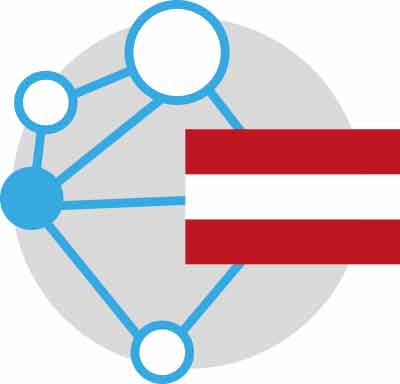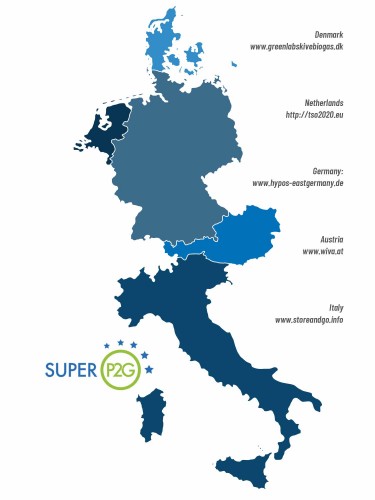
transnational
The switch to a CO2-neutral energy system in the future entails major challenges. Power-to-gas (P2G) technology could make an important contribution here. In this process, electri-city from renewable sources is used to produce hydrogen by means of water electrolysis and, in an optional second step, it can be combined with carbon dioxide (CO2) to produce synthetic methane. The conversion of energy with the help of power-to-gas technologies opens up many options for future integrated energy systems and enables a coupling of the electricity, heating/cooling and mobility sectors. The technology offers solutions for developing a CO2-neutral energy system, such as the long-term storage of fluctuating renewable power sources and providing renewable energy carriers for industrial processes and mobility.
There are now a large number of P2G pilot or test plants in Europe. However, these can usually only be implemented and operated with public funding, because commercial use is often not yet possible. Among other things, the general conditions that would reward the additional positive system benefits of P2G plants are still lacking at the moment. This is where the SuperP2G1 project comes in. Within the framework of the ERA-Net cooperation, the plan is to develop strategies for the commercial implementation of this technology. Important topics are its technical optimisation and system integration, how to bring Power-to-Gas to the market, increase its acceptance, and develop customised solutions for companies.
Case studies in five countries
Die The transnational cooperation aims to bring together the leading European power-to-gas initiatives – in Austria this is the flagship region WIVA P&G2. Case studies are being carried out in five countries in order to initiate joint learning processes and approaches to solutions. Each national project focuses on specific issues. New strategies and solutions are developed by researchers in close cooperation with local stakeholders. The Austrian contribution involves analysing the future demand for renewable hydrogen and SNG (Synthetic Natural Gas) in industry. An important focus is on simulating the cost trends. For this purpose, a special methodology will be developed and validated using Austria as an example. Among other things, the tools developed at the Energy Institute at Johannes Kepler University Linz (CoLLeCT, PResTiGE, and MOVE) will be expanded in order to be able to estimate future demand and the cost trends of renewable gases. The resulting data will then be incorporated into a cross-border SuperP2G tool.

Exchange of know-how
The findings from the case studies will be shared by the project partners and in the ERA-Net Knowledge Community. Based on these findings, the aim is to assess how power-to-gas technology can be used to improve renewable and regional system integration. Key questions concern the possibilities for regional purchase of green gas, involving regional stakeholders, as well as the potential for scaling up power-to-gas to other EU regions.
www.superp2g.eu
1 PROJECT PARTNERS:
Technical University of Denmark (project management), Greenlab Skive (Denmark), Energy Institute at Johannes Kepler University Linz (Austria), DGI Gasttechnologisches Institut GmbH, DVGW Research Station at Engler-Bunte-Institute, Karlsruhe Institute of Technology (KIT) (Germany), National Research Council of Italy, CNR ITAE, University of Bologna/Department of Industrial Engineering (Italy), University of Groningen/Faculty of Economics and Business (Netherlands), European Research Institut for Gas and Energy Innovation (Belgium)
2 www.wiva.at
This project has been funded by partners of the ERA-Net SES 2018 joint call RegSys. As such, this project has received funding from the European Union’s Horizon 2020 research and innovation programme under grant agreement no. 775970.
www.eranet-smartenergysystems.eu
Links to Project Partners (see illustration):
Denmark / www.greenlabskivebiogas.dk
The Netherlands / http://tso2020.eu
Germany/ www.hypos-eastgermany.de
Austria / www.wiva.at
Italy / www.storeandgo.info